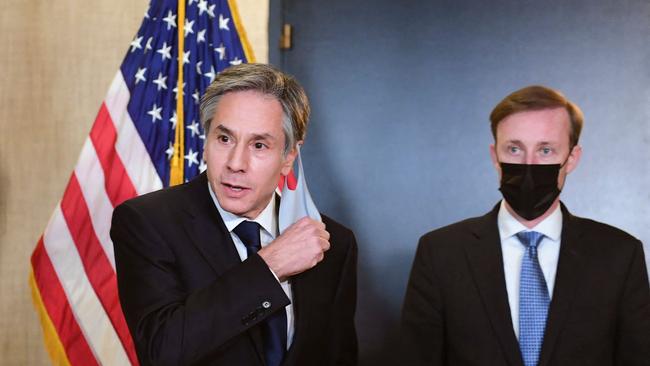Blinken rallies Europe, NATO after Chinese blizzard
America’s chief diplomat has flown to Brussels to rally European allies after a testy meeting with Xi Jinping’s senior advisers.

Joe Biden’s chief diplomat has flown to Brussels to rally America’s European allies after a testy meeting with senior advisers to Chinese President Xi Jinping in Alaska that demonstrated the breakdown in trust between the two superpowers.
Concerns about China and President Vladimir Putin’s Russia will dominate this week’s talks between US Secretary of State Antony Blinken, NATO secretary-general Jens Stoltenberg and other European leaders.
“These meetings will be an opportunity for ministers to discuss the NATO 2030 proposals for alliance adaptation, concerns over China and Russia, as well as climate change, cyber security, combating terrorism, energy security, and other common challenges we face together,” the US State Department said.
Beijing from Monday will host Russia’s foreign minister as the two authoritarian powers discuss tactics for dealing with the new US administration, which has returned allies and partners to the centre of America’s foreign policy.
The simultaneous meetings follow the first face-to-face dealings between senior officials of the Biden administration and China in Anchorage.
That two-day summit began with a spectacular public outburst by Mr Xi’s most senior foreign policy adviser, Yang Jiechi, after Mr Blinken made a blunt opening statement about American concerns over China’s policies in Xinjiang, Hong Kong and Taiwan, all highly sensitive issues for Beijing.
Mr Yang’s more than 15-minute critique of US democracy and defence of the Chinese Communist Party’s legacy —and subsequent second spray — were widely praised in China.
Experts such as Peking University’s Wang Dong said the speech was like a “heavy strike on the head” that helped dispel the arrogance of the American side.
“To make the opening intense is good for China. This could eliminate the illusion in the US mind that it can pressure China into compromise by being rude,” Professor Wang told state media.
The two sides agreed to set up a working group on climate change, a rare area of agreement in the two-day encounter.
Much of the three private sessions involved the burgeoning range of issues that divide the world’s two most powerful countries, including cyber attacks, China’s militarisation of the South China Sea, American visa restrictions on Chinese government officials and China’s coercive trade strikes on more than $20bn-a-year of Australian exports.
“We expected to have tough direct talks on a wide range of issues, and that’s exactly what we had,” US National Security Adviser Jake Sullivan said after the meeting.
“We were clear-eyed going in and we’re clear-eyed coming out.”
Speaking in a separate press conference after the meeting, China’s Foreign Minister, Wang Yi, said the US had to respect Beijing’s “core interests”.
“We hope the US is not going to underestimate China’s determination to defend its territory, to safeguard its people, and maintain its righteous interest,” he said.
Chicago University’s Dali Yang said neither side wanted to make concessions at the meeting.
“There’s not a lot of space. Clearly we are not going back to the time prior to the Trump administration when both sides would try to find commonalities,” Professor Yang, an expert on Chinese politics, told The Australian.
“At this point, it’s really about seeking some commonalities from the jaws of animosity and competitiveness.”
In Brussels this week, Mr Blinken will meet with a European leadership increasingly concerned about China.
During his visit, EU foreign ministers are expected to impose sanctions on Chinese officials accused of human rights abuses in Xinjiang. It will be the first time Europe has punished China in such a manner since the Tiananmen Square crackdown in 1989.
In a strategy update, NATO last November called China a major security concern for the world’s biggest military alliance.
“NATO must devote much more time, political resources and action to the security challenges posed by China — based on an assessment of its national capabilities, economic heft and the stated ideological goals of its leaders,” said a once-in-a-decade review led by Mr Stoltenberg.
China was mentioned 86 times in the strategic update, which Mr Blinken in coming days will discuss with NATO’s leadership. Russia was mentioned 96 times.
A similar review conducted by NATO in 2010 — two years before the Xi era — did not mention China at all.




To join the conversation, please log in. Don't have an account? Register
Join the conversation, you are commenting as Logout